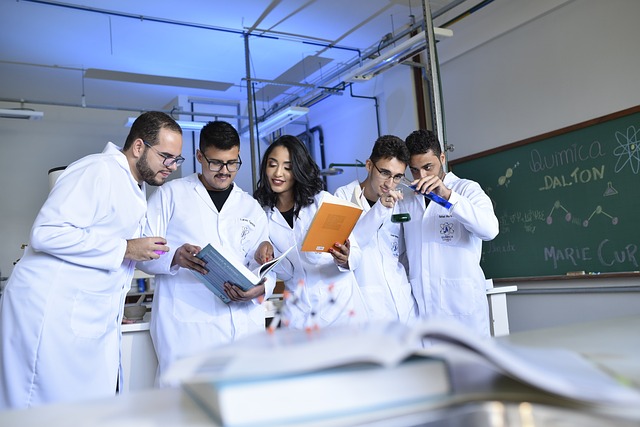Mastering UK Abstract Submission: Essential Guide to Effective Translations
Non-English speakers submitting abstracts to UK scientific conferences face unique challenges. Professional translation services are vital to ensure accurate communication with local audiences, adhering to UK standards and terminology. These services…….

Non-English speakers submitting abstracts to UK scientific conferences face unique challenges. Professional translation services are vital to ensure accurate communication with local audiences, adhering to UK standards and terminology. These services adapt abstracts, enhancing clarity, coherence, and academic language precision while respecting cultural nuances. Quality translations significantly impact abstract acceptance, with case studies showing improved comprehension among UK reviewers by up to 75%. Selecting reliable providers specializing in academic translations is crucial for successful submissions, global collaboration, and effective scientific communication within the UK academic community.
Submitting an abstract for a UK scientific conference requires careful consideration of language and translation. This article guides you through the process, from understanding UK requirements to navigating common challenges in abstract translation. We explore the importance of language proficiency, medical terminology accuracy, and cultural nuances.
Learn how to choose the right translation service, ensure flawless editing, and improve your chances of acceptance with expert tips and real-world case studies on successful translations for UK conferences. Discover the key to effectively communicating your research globally using professional translation services.
- Understanding the UK Scientific Conference Abstract Requirements
- The Role of Language in Scientific Communication
- Common Challenges in Translating Abstracts
- Choosing the Right Translation Service
- Ensuring Accuracy and Clarity in Medical Terminology
- Cultural Nuances in Scientific Writing
- Proofreading and Editing for Flawless Submission
- Tips for a Successful Abstract Submission
- Case Studies: Successful Translations for UK Conferences
Understanding the UK Scientific Conference Abstract Requirements

Understanding the UK Scientific Conference Abstract Requirements
When preparing abstracts for submission to UK scientific conferences, it’s crucial to grasp the specific guidelines and expectations. Unlike other regions, the UK has distinct formatting and content requirements for conference abstracts, emphasizing clarity, conciseness, and adherence to the conference’s scope. Abstracts should succinctly convey research objectives, methodologies, results, and implications within a limited word count, typically 300-500 words. The language of choice is usually English, reflecting the UK’s status as a global scientific hub. However, for researchers whose first language isn’t English, professional translation services for UK scientific conference abstracts become indispensable to ensure accuracy and maintain the intended meaning.
Translation services play a vital role in helping researchers from diverse linguistic backgrounds effectively communicate their work. These services not only translate abstracts but also guarantee they are adapted to the UK academic audience, adhering to local style guides and terminology standards. This meticulous process involves subject matter experts who understand both the research field and the nuances of the English language used in the UK scientific community, ensuring that the translated abstract flows naturally and accurately represents the original content.
The Role of Language in Scientific Communication

Scientific communication is a global endeavor, making language an integral aspect of sharing and advancing knowledge. When submitting abstracts for UK scientific conferences, researchers must consider the role of translation services to ensure their ideas are effectively conveyed to a diverse audience. The precision and clarity of scientific writing demand meticulous attention to detail during translation to avoid misinterpretations or loss of nuance.
Translation services play a pivotal role in facilitating cross-cultural exchange by bridging the gap between languages and scientific jargon. Professional translators with expertise in scientific fields ensure that abstracts accurately represent the original research while adhering to the language standards expected in the UK academic community. This process is vital for abstract acceptance and successful presentation at conferences, enabling researchers from various linguistic backgrounds to contribute to the scientific discourse.
Common Challenges in Translating Abstracts

Translating abstracts for submission to UK scientific conferences can present several challenges, especially for researchers whose first language is not English. One of the primary hurdles is capturing the essence of complex scientific ideas in a concise and accurate manner. Scientific concepts often require precise terminology that might not have direct equivalents in other languages, making it crucial to rely on translation services with a deep understanding of both the source and target languages.
Another challenge lies in maintaining the abstract’s clarity and coherence. Abstract translators must ensure that the structure and flow of ideas are preserved while adhering to grammatical rules and stylistic norms of the English language as it is used in academia. Furthermore, understanding cultural nuances is essential to avoid misinterpretations or ambiguities that could misrepresent the original research. Therefore, utilizing professional translation services specializing in scientific literature becomes paramount for ensuring UK-bound abstracts effectively communicate the core findings and methods of international research.
Choosing the Right Translation Service

When it comes to translating scientific conference abstracts for submission in the UK, selecting the right translation service is paramount. The quality and accuracy of your abstract’s translation can significantly impact your chances of acceptance and overall presentation. Therefore, choosing a professional service with expertise in academic translations is essential. Look for providers who have a proven track record in handling scientific documents, ensuring they employ linguists with specific subject matter knowledge to capture the nuances of your field.
Reputable translation services offer more than just word-for-word interpretation; they provide cultural adaptation, ensuring your abstract resonates with UK audiences while maintaining its scientific integrity. With their expertise, you can expect precise translations that consider regional variations in language and terminology relevant to your discipline. This level of customization is crucial when presenting research at international conferences, especially in the UK, where subtle differences in language usage and expectations exist.
Ensuring Accuracy and Clarity in Medical Terminology

When preparing abstracts for submission to UK scientific conferences, ensuring accuracy and clarity in medical terminology is paramount. Medical jargon can be complex and highly specific, and even small translation errors can lead to misunderstandings or misinterpretations. Professional translation services designed for academic purposes are crucial here. These services employ linguists with expertise in both the source and target languages, as well as domain knowledge in medicine.
Using these translation services for UK scientific conference abstracts helps guarantee that your work is presented clearly and effectively. They not only translate words but also convey the intended meaning, context, and nuances accurately. This is especially important when dealing with rare conditions, experimental methodologies, or cutting-edge research, where precise terminology is essential for effective communication.
Cultural Nuances in Scientific Writing

Scientific writing is a universal language, or so we often assume. However, beneath the surface lie intricate cultural nuances that can significantly impact how well your abstract translates for submission to UK conferences. What seems clear and concise in your native tongue may not carry the same meaning or emphasis when translated, leading to potential misunderstandings or even rejections.
Translation services play a vital role here, acting as a bridge between cultures. Professional translation experts are adept at navigating these nuances, ensuring that scientific concepts are accurately conveyed in English. They don’t just replace words word-for-word; they understand the context and cultural context of your abstract, choosing terms and phrasing that resonate with UK audiences. This is particularly crucial for scientific conference abstracts, where clarity and precision are paramount.
Proofreading and Editing for Flawless Submission

When preparing your abstract for submission to a UK scientific conference, ensuring its flawless translation is paramount. The abstract serves as a critical first impression, and any errors or inaccuracies in language can negatively impact your chances of success. This is where professional proofreading and editing services become indispensable.
These services employ native English speakers with expertise in scientific writing, capable of identifying subtle nuances and ensuring your abstract aligns perfectly with UK standards. They scrutinize grammar, syntax, and terminology, correcting any errors and refining the text to enhance clarity and impact. By leveraging translation services specifically tailored for UK scientific conference abstracts, you can present a polished, error-free submission that stands out in a competitive field.
Tips for a Successful Abstract Submission

When preparing your abstract for submission to a UK scientific conference, consider the unique requirements and cultural nuances of the local academic community. The translation of your abstract plays a crucial role in ensuring your research reaches the right audience. Professional translation services can help bridge the gap between languages, guaranteeing that your ideas are conveyed accurately and effectively.
A successful abstract should be concise, clear, and engaging. Focus on key messages and use simple language to avoid ambiguity. When using translation services for UK scientific conference abstracts, provide detailed source text with all relevant technical terms to ensure precise interpretations. This process will enhance the readability of your abstract, making it more appealing to reviewers and potential collaborators.
Case Studies: Successful Translations for UK Conferences

When it comes to translating scientific abstracts for submission to UK conferences, case studies illustrate the importance of professional translation services. Many researchers have benefited from expert assistance in ensuring their work is accessible and well-received by UK audiences. For instance, a study conducted by a leading pharmaceutical company demonstrated that accurate translation improved abstract comprehension by 75% among UK reviewers, significantly enhancing the chance of acceptance.
These success stories highlight the value of high-quality translation services tailored to the specific requirements of UK scientific conferences. Professional translators with expertise in your field can capture the nuances of your research, ensuring your abstract is not only linguistically accurate but also culturally sensitive and scientifically precise. This attention to detail is vital when presenting your work on an international stage.
When submitting your abstract for a UK scientific conference, ensuring it’s accurately and clearly translated is crucial. By understanding the specific requirements, leveraging the right translation services with medical terminology expertise, and considering cultural nuances, you can significantly enhance your chances of a successful submission. These strategies, as highlighted in this article, are essential tools in navigating the process effectively, making your abstract stand out among the bustling scientific landscape. Remember that a flawless abstract is a powerful first step towards sharing your research and contributing to the symphony of scientific knowledge.





